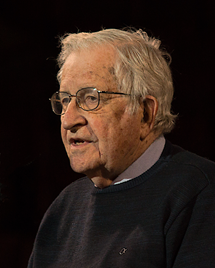12.3: Nativism
- Page ID
- 140701
Nativism and Language Acquisition
Nativism suggests that infants are born with an innate ability to acquire language that is hardwired in human brains. The linguist Noam Chomsky, the most well-known nativist, argued that human brains contain a language acquisition device (LAD) that includes a universal grammar that underlies all human language (Chomsky, 1965, 1972). Chomsky proposed that children are born with knowledge of general grammatical rules so that with exposure, children are able to acquire language rapidly and with relative ease. The idea is that each of the many languages used around the world has the same underlying set of grammatical rules that are hardwired into human brains--a “universal grammar”. Chomsky (1959) rebutted behaviorism’s argument on several grounds. Chomsky argued that it was unlikely that parents were doing the slow and careful shaping of children’s vocalizations that behaviorism proposed. According to Chomsky, language develops as long as the infant is exposed to it. No additional teaching, training, or reinforcement is required for language to develop. [1] [2]

- All human languages share certain properties.
- Children are exposed to different inputs yet still converge on the same grammar.
- Children know things about language which they could not have learned from the input available to them. This is the most famous, and most powerful, argument for universal grammar.
- Humans are the only species that has language.
- Children learn language quickly and effortlessly, on minimal exposure.
- All children acquiring language go through the same stages in the same order.
- Different brain circuits are responsible for representing/processing linguistic and non-linguistic information.
There is general agreement among experts that babies are genetically programmed to learn language. In fact, fetuses have already begun their language acquisition journey while they are still in the womb (DeCasper & Spence, 1986; Ghio, Cara & Tettamanti, 2021; Moon, Lagercrantz & Kuhl, 2013)! Additionally, children are born ready to acquire any language they are exposed to, even languages of an entirely different modality (spoken modality versus a signed modality), such as a American Sign Language (Krentz & Corina, 2008; Stone, Petitto & Bosworth, 2018). Neuroscience continues to document the innate brain mechanisms that support language acquisition in infants (Friederici, 2017; Friederici & Wartenburger, 2010; Kuhl, 2010; Perani, et al., 2011). Nevertheless, there is still debate about Chomsky’s idea that there is a universal grammar that can account for all language learning. Evans and Levinson (2009) surveyed the world’s languages and found that none of the presumed underlying features of the language acquisition device were entirely universal. In their search they found languages that did not have noun or verb phrases, that did not have tenses (e.g., past, present, future), and even some that did not have nouns or verbs at all, even though a basic assumption of a universal grammar is that all languages should share these features. Another limitation to the nativist theory is their lack of acknowledgement of the role of social interactions and cultural contexts in language acquisition. In summary, most experts agree that children are born primed to acquire language; however, the role of social interactions and the effect various contexts can have on the acquisition process is undeniable. [1] [4]
[1] Martha Lally and Suzanne Valentine-French (2019). Lifespan Development: A Psychological Perspective, Second Edition. CC by 4.0 http://dept.clcillinois.edu/psy/LifespanDevelopment.pdf
[2] Sturdy, C. B., & Nicoladis, E. (2017). How much of language acquisition does operant conditioning explain?. Frontiers in Psychology, 8, 1918. CC by 4.0 https://www.frontiersin.org/articles/10.3389/fpsyg.2017.01918/full
[3] Image from Wikimedia CC by 4.0
[4] Dąbrowska, E. (2015). What exactly is Universal Grammar, and has anyone seen it?. Frontiers in Psychology, 6, 852. CC by 4.0 https://www.frontiersin.org/articles/10.3389/fpsyg.2015.00852/full

